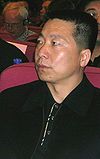Portal:Spaceflight/Selected biography/September 2008
Yáng Lìwěi (simplified Chinese: 杨利伟; traditional Chinese: 楊利偉) (born 21 June 1965) is a Chinese military pilot and a CNSA astronaut. He was the first man sent into space by the Chinese space programme, and his mission, Shenzhou 5, made the PRC the third country to independently send people into space.
He was born in Suizhong County of Huludao City in the Liaoning Province, an industrial area in Northeast China. Yang's mother was a teacher, his father an accountant at a state agricultural firm. Yang Liwei's wife is also a People's Liberation Army (PLA) officer, with whom he has a son. He joined the PLA when he was 18 years old and worked his way from Lieutenant Colonel to the rank of Colonel. He attended No. 8 Aviation College of the PLA Air Force in 1987 and graduated with a Bachelor's degree. In the PLAAF, he logged 1350 hours of flight time as a fighter pilot before he went to space training.
He was launched into space aboard his Shenzhou 5 spacecraft atop a Long March 2F rocket from Jiuquan Satellite Launch Centre at 01:00 UTC on 15 October 2003. Yang's craft landed in the grasslands of the Chinese region of Inner Mongolia at around 22:00 UTC, having completed 14 orbits and travelled more than 600,000 kilometres. Yang left the capsule about 15 minutes after landing, and was congratulated by Chinese Premier Wen Jiabao. He is now the Vice Director of the Chinese Astronaut Training Centre (more...)

